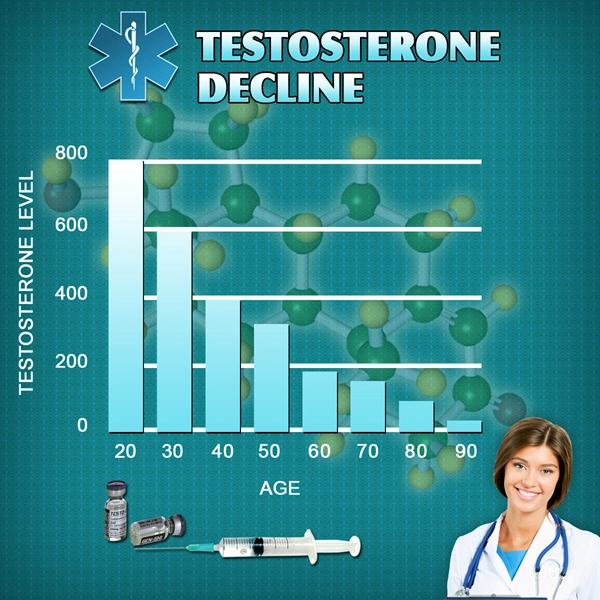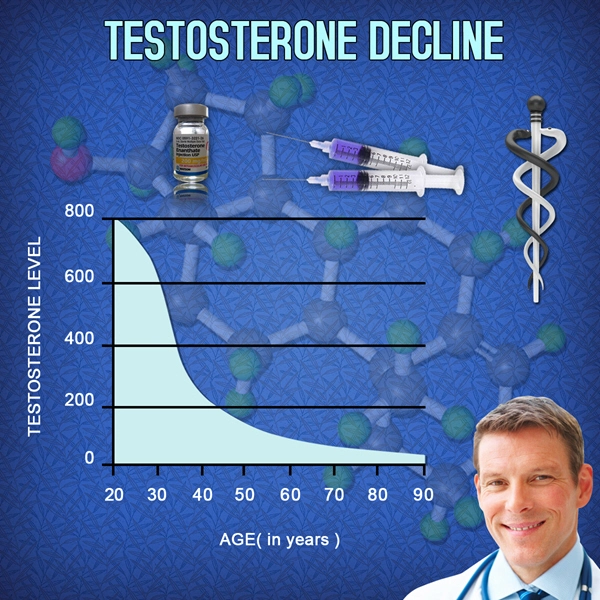Introduction
Testosterone undecanoate, a long-acting injectable form of testosterone, has been increasingly utilized in the management of hypogonadism among American males. While its benefits in improving libido, muscle mass, and overall well-being are well-documented, concerns regarding its impact on blood clotting have emerged. This article delves into the relationship between testosterone undecanoate and coagulation, providing crucial insights for healthcare providers and patients alike.
Understanding Testosterone Undecanoate
Testosterone undecanoate is a synthetic version of the primary male sex hormone, designed to provide a sustained release over several weeks. Its use has surged in the United States, particularly among men seeking to address symptoms of low testosterone, such as fatigue, decreased sexual function, and mood disturbances. The convenience of less frequent dosing compared to other testosterone formulations has contributed to its popularity.
The Coagulation Conundrum
Recent studies have raised questions about the potential thrombotic risks associated with testosterone therapy, including testosterone undecanoate. Thrombosis, the formation of blood clots within blood vessels, can lead to serious health issues such as deep vein thrombosis (DVT) and pulmonary embolism (PE). The concern stems from testosterone's potential to influence various components of the coagulation cascade, including platelet function and clotting factors.
Research Findings
A comprehensive review of clinical trials and observational studies has provided mixed results regarding the impact of testosterone undecanoate on blood clotting. Some studies suggest a modest increase in hematocrit levels, which could theoretically predispose individuals to thrombosis. However, other research indicates no significant alteration in key coagulation markers, such as prothrombin time and activated partial thromboplastin time, following testosterone undecanoate administration.
Clinical Implications for American Males
For American men considering or currently using testosterone undecanoate, understanding the potential risks and benefits is paramount. Healthcare providers should conduct a thorough assessment of each patient's cardiovascular and thromboembolic risk factors before initiating therapy. Regular monitoring of hematocrit levels and signs of thrombosis is advisable, particularly in those with pre-existing conditions that may heighten susceptibility to clotting.
Mitigating Risks
To minimize the potential for adverse coagulation events, several strategies can be employed. Ensuring adequate hydration, maintaining a healthy lifestyle, and avoiding prolonged immobility are general measures that can reduce the risk of thrombosis. Additionally, healthcare providers may consider the use of anticoagulant therapy in high-risk individuals, although this should be approached with caution and under close medical supervision.
Patient Education and Awareness
Educating American males about the signs and symptoms of thrombosis, such as leg swelling, pain, and shortness of breath, is crucial. Patients should be encouraged to seek immediate medical attention if they experience any concerning symptoms while on testosterone undecanoate therapy. Open communication between patients and healthcare providers can facilitate early detection and intervention, potentially averting serious complications.
Conclusion
The relationship between testosterone undecanoate and blood clotting in American males remains a topic of ongoing research and clinical interest. While the evidence is not yet conclusive, a cautious approach to its use, coupled with vigilant monitoring and patient education, can help mitigate potential risks. As the body of evidence grows, healthcare providers must stay informed to provide the safest and most effective care for their patients.
Future Directions
Continued research into the long-term effects of testosterone undecanoate on coagulation is essential. Large-scale, prospective studies that account for various confounding factors, such as age, comorbidities, and concurrent medications, will be instrumental in clarifying the true impact of this therapy on blood clotting. Until then, a balanced approach that weighs the benefits against the potential risks will serve American males best in their pursuit of optimal health and well-being.

- Testosterone Undecanoate: Enhancing Athletic Performance in American Males - Benefits and Risks [Last Updated On: March 10th, 2025] [Originally Added On: March 10th, 2025]
- Testosterone Undecanoate: A Breakthrough in Managing Andropause for American Men [Last Updated On: March 17th, 2025] [Originally Added On: March 17th, 2025]
- Testosterone Undecanoate: A Promising Weight Management Solution for American Men [Last Updated On: March 18th, 2025] [Originally Added On: March 18th, 2025]
- Testosterone Undecanoate: Managing Hypogonadism in American Males [Last Updated On: March 18th, 2025] [Originally Added On: March 18th, 2025]
- Optimizing Testosterone Undecanoate Therapy with Diet and Exercise for American Men [Last Updated On: March 19th, 2025] [Originally Added On: March 19th, 2025]
- Testosterone Undecanoate: Long-Acting Treatment for Hypogonadism in American Men [Last Updated On: March 20th, 2025] [Originally Added On: March 20th, 2025]
- Testosterone Undecanoate: Importance of Regular Monitoring for American Men's Health [Last Updated On: March 20th, 2025] [Originally Added On: March 20th, 2025]
- Testosterone Undecanoate: Enhancing Life Quality for American Men with Low Testosterone [Last Updated On: March 20th, 2025] [Originally Added On: March 20th, 2025]
- Cultural Perceptions of Testosterone Undecanoate Use Among American Males [Last Updated On: March 20th, 2025] [Originally Added On: March 20th, 2025]
- Testosterone Undecanoate: A Promising Therapy for Chronic Fatigue in American Men [Last Updated On: March 20th, 2025] [Originally Added On: March 20th, 2025]
- Safety and Benefits of Testosterone Undecanoate for Hypogonadism in American Males [Last Updated On: March 21st, 2025] [Originally Added On: March 21st, 2025]
- Testosterone Undecanoate's Impact on Sleep Quality in American Males: Benefits and Considerations [Last Updated On: March 21st, 2025] [Originally Added On: March 21st, 2025]
- Testosterone Undecanoate: Economic Benefits and Healthcare Cost Reduction in Hypogonadism Treatment [Last Updated On: March 21st, 2025] [Originally Added On: March 21st, 2025]
- Testosterone Undecanoate's Impact on Metabolic Health in American Men: A Comprehensive Review [Last Updated On: March 21st, 2025] [Originally Added On: March 21st, 2025]
- Testosterone Undecanoate's Impact on Cognitive Function in American Men with Hypogonadism [Last Updated On: March 22nd, 2025] [Originally Added On: March 22nd, 2025]
- Testosterone Undecanoate: Benefits, Stigma, and Misconceptions in American Males [Last Updated On: March 22nd, 2025] [Originally Added On: March 22nd, 2025]
- Testosterone Undecanoate: Enhancing Male Longevity and Quality of Life [Last Updated On: March 22nd, 2025] [Originally Added On: March 22nd, 2025]
- Testosterone Undecanoate: Combatting Muscle Loss in Aging American Males [Last Updated On: March 23rd, 2025] [Originally Added On: March 23rd, 2025]
- Testosterone Undecanoate: Efficacy and Safety in American Men with Hypogonadism [Last Updated On: March 23rd, 2025] [Originally Added On: March 23rd, 2025]
- Testosterone Undecanoate's Impact on Dental Health in American Males: Benefits and Risks [Last Updated On: March 23rd, 2025] [Originally Added On: March 23rd, 2025]
- Testosterone Undecanoate: Enhancing Emotional Well-being in American Men [Last Updated On: March 24th, 2025] [Originally Added On: March 24th, 2025]
- Testosterone Undecanoate: Impacts on Hair Growth and Loss in American Males [Last Updated On: March 24th, 2025] [Originally Added On: March 24th, 2025]
- Testosterone Undecanoate: Enhancing Sexual Health in American Men with Hypogonadism [Last Updated On: March 24th, 2025] [Originally Added On: March 24th, 2025]
- Testosterone Undecanoate's Impact on Skin Health in American Males: Benefits and Risks [Last Updated On: March 24th, 2025] [Originally Added On: March 24th, 2025]
- Testosterone Undecanoate: Benefits, Side Effects, and Management Strategies for American Men [Last Updated On: March 24th, 2025] [Originally Added On: March 24th, 2025]
- Testosterone Undecanoate's Impact on Immune Function in American Males: A Comprehensive Review [Last Updated On: March 25th, 2025] [Originally Added On: March 25th, 2025]
- Testosterone Undecanoate: A Promising Therapy for Hypogonadism in Male Cancer Survivors [Last Updated On: March 25th, 2025] [Originally Added On: March 25th, 2025]
- Testosterone Undecanoate: Enhancing Veterans' Health and Well-being [Last Updated On: March 25th, 2025] [Originally Added On: March 25th, 2025]
- Testosterone Undecanoate's Impact on Liver Health in American Males: A Comprehensive Review [Last Updated On: March 25th, 2025] [Originally Added On: March 25th, 2025]
- Testosterone Undecanoate: Long-Acting Treatment for American Men's Low Testosterone [Last Updated On: March 25th, 2025] [Originally Added On: March 25th, 2025]
- Testosterone Undecanoate's Impact on Vision and Eye Health in American Men [Last Updated On: March 25th, 2025] [Originally Added On: March 25th, 2025]
- Testosterone Undecanoate Boosts Endurance in American Men: A Comprehensive Overview [Last Updated On: March 25th, 2025] [Originally Added On: March 25th, 2025]
- Testosterone Undecanoate: Tailoring TRT for Diverse American Male Demographics [Last Updated On: March 25th, 2025] [Originally Added On: March 25th, 2025]
- Testosterone Undecanoate: A Promising Therapy for Osteoporosis in American Men [Last Updated On: March 25th, 2025] [Originally Added On: March 25th, 2025]
- Testosterone Undecanoate: Enhancing Cognitive Function in American Men [Last Updated On: March 26th, 2025] [Originally Added On: March 26th, 2025]
- Testosterone Undecanoate: Enhancing Fertility in American Men [Last Updated On: March 26th, 2025] [Originally Added On: March 26th, 2025]
- Testosterone Undecanoate's Impact on Respiratory Health in American Men: Benefits and Risks [Last Updated On: March 26th, 2025] [Originally Added On: March 26th, 2025]
- Testosterone Undecanoate's Impact on Hearing in American Males: A Comprehensive Review [Last Updated On: March 26th, 2025] [Originally Added On: March 26th, 2025]
- Testosterone Undecanoate: Enhancing Injury Recovery in American Males [Last Updated On: March 26th, 2025] [Originally Added On: March 26th, 2025]
- Testosterone Undecanoate's Impact on Digestive Health in American Males: A Comprehensive Review [Last Updated On: March 26th, 2025] [Originally Added On: March 26th, 2025]
- Testosterone Undecanoate's Impact on Kidney Health in American Men: A Comprehensive Review [Last Updated On: March 26th, 2025] [Originally Added On: March 26th, 2025]
- Testosterone Undecanoate's Impact on Joint Health in American Males: Benefits and Risks [Last Updated On: March 27th, 2025] [Originally Added On: March 27th, 2025]
- Testosterone Undecanoate: A Promising Therapy for Diabetes Management in American Males [Last Updated On: March 27th, 2025] [Originally Added On: March 27th, 2025]
- Testosterone Undecanoate: Minimal Impact on Blood Pressure in American Men [Last Updated On: March 27th, 2025] [Originally Added On: March 27th, 2025]
- Testosterone Undecanoate: A Promising Solution for Stress Management in American Males [Last Updated On: March 27th, 2025] [Originally Added On: March 27th, 2025]
- Testosterone Undecanoate's Impact on Cholesterol: Insights for American Men [Last Updated On: March 28th, 2025] [Originally Added On: March 28th, 2025]
- Testosterone Undecanoate: A Novel Approach to Managing Allergies in American Males [Last Updated On: March 28th, 2025] [Originally Added On: March 28th, 2025]
- Testosterone Undecanoate's Impact on Nail Health in American Males: Benefits and Risks [Last Updated On: March 29th, 2025] [Originally Added On: March 29th, 2025]
- Testosterone Undecanoate Enhances Skin Elasticity in American Men: A Clinical Insight [Last Updated On: March 29th, 2025] [Originally Added On: March 29th, 2025]
- Testosterone Undecanoate: A Promising Therapy for Chronic Pain in American Males [Last Updated On: March 30th, 2025] [Originally Added On: March 30th, 2025]
- Testosterone Undecanoate: Dosage Adjustments for American Men with Hypogonadism [Last Updated On: March 30th, 2025] [Originally Added On: March 30th, 2025]
- Testosterone Undecanoate: Benefits and Hair Loss Risks for American Men [Last Updated On: March 30th, 2025] [Originally Added On: March 30th, 2025]
- Testosterone Undecanoate: Benefits, Risks, and Impact on American Male Health [Last Updated On: March 31st, 2025] [Originally Added On: March 31st, 2025]
- Testosterone Undecanoate Therapy: Monitoring and Managing Hypogonadism in American Men [Last Updated On: April 1st, 2025] [Originally Added On: April 1st, 2025]
- Testosterone Undecanoate: Enhancing Muscle, Reducing Fat in American Males [Last Updated On: April 3rd, 2025] [Originally Added On: April 3rd, 2025]
- Testosterone Undecanoate: Enhancing Immune Function in American Men [Last Updated On: April 4th, 2025] [Originally Added On: April 4th, 2025]
- Testosterone Undecanoate's Impact on Heart Rate Variability in American Men [Last Updated On: April 6th, 2025] [Originally Added On: April 6th, 2025]
- Testosterone Undecanoate's Impact on Glycemic Control in American Males with Hypogonadism [Last Updated On: April 8th, 2025] [Originally Added On: April 8th, 2025]
- Testosterone Undecanoate: A Novel Approach to Managing Anxiety in American Males [Last Updated On: April 8th, 2025] [Originally Added On: April 8th, 2025]
- Testosterone Undecanoate: Enhancing Muscle Recovery in American Men - Benefits and Risks [Last Updated On: April 9th, 2025] [Originally Added On: April 9th, 2025]
- Testosterone Undecanoate: Enhancing Muscle Strength in American Men [Last Updated On: April 9th, 2025] [Originally Added On: April 9th, 2025]
- Testosterone Undecanoate: Enhancing Bone Health in American Men [Last Updated On: April 10th, 2025] [Originally Added On: April 10th, 2025]
- Testosterone Undecanoate: A Promising Treatment for Depression in American Males [Last Updated On: April 11th, 2025] [Originally Added On: April 11th, 2025]
- Testosterone Undecanoate's Impact on Skin Pigmentation in American Males: Insights and Management [Last Updated On: April 12th, 2025] [Originally Added On: April 12th, 2025]
- Managing Testosterone Undecanoate Side Effects: A Guide for American Men [Last Updated On: April 13th, 2025] [Originally Added On: April 13th, 2025]



List of USA state clinics - click a flag below for blood testing clinics.
Word Count: 584



















































